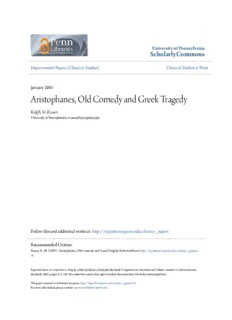
Aristophanes, Old Comedy and Greek Tragedy PDF
Preview Aristophanes, Old Comedy and Greek Tragedy
UUnniivveerrssiittyy ooff PPeennnnssyyllvvaanniiaa SScchhoollaarrllyyCCoommmmoonnss Departmental Papers (Classical Studies) Classical Studies at Penn January 2005 AArriissttoopphhaanneess,, OOlldd CCoommeeddyy aanndd GGrreeeekk TTrraaggeeddyy Ralph M. Rosen University of Pennsylvania, [email protected] Follow this and additional works at: https://repository.upenn.edu/classics_papers RReeccoommmmeennddeedd CCiittaattiioonn Rosen, R. M. (2005). Aristophanes, Old Comedy and Greek Tragedy. Retrieved from https://repository.upenn.edu/classics_papers/26 Reprinted from A Companion to Tragedy, edited by Rebecca Bushnell, Blackwell Companions to Literature and Culture, number 32 (Massachusetts: Blackwell, 2005), pages 251-268. The author has asserted his right to include this material in ScholarlyCommons@Penn. This paper is posted at ScholarlyCommons. https://repository.upenn.edu/classics_papers/26 For more information, please contact [email protected]. AArriissttoopphhaanneess,, OOlldd CCoommeeddyy aanndd GGrreeeekk TTrraaggeeddyy AAbbssttrraacctt In a famous scene at the end of Plato's symposium, after a high-minded philosophical discussion about the nature of love at a festive dinner party had degenerated into a drunken free-for-all, only three of the guests were sober enough to continue the conversation: the philosopher Socrates, the tragic poet Agathon, and the comic poet Aristophanes. CCoommmmeennttss Reprinted from A Companion to Tragedy, edited by Rebecca Bushnell, Blackwell Companions to Literature and Culture, number 32 (Massachusetts: Blackwell, 2005), pages 251-268. The author has asserted his right to include this material in ScholarlyCommons@Penn. This book chapter is available at ScholarlyCommons: https://repository.upenn.edu/classics_papers/26
Description: